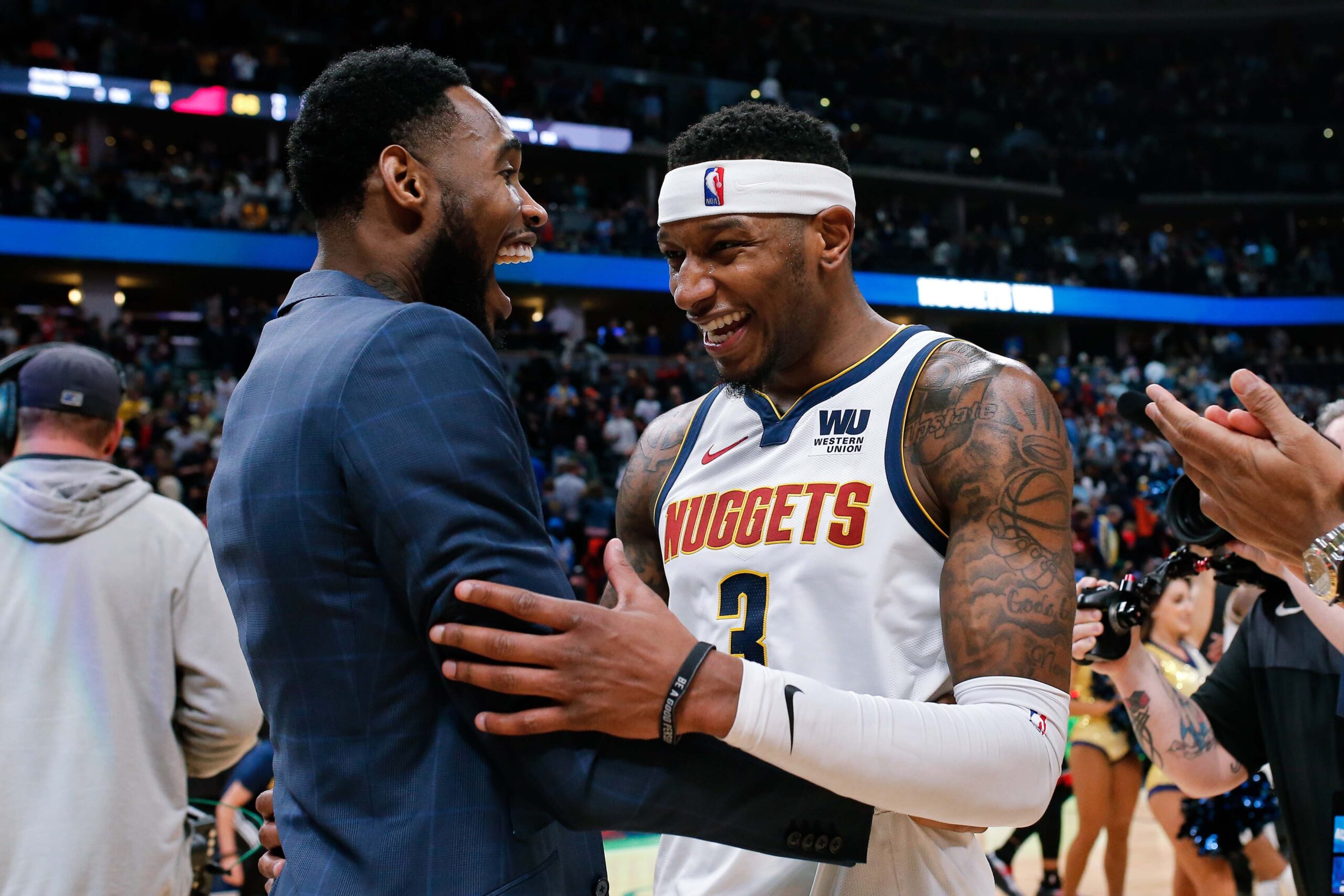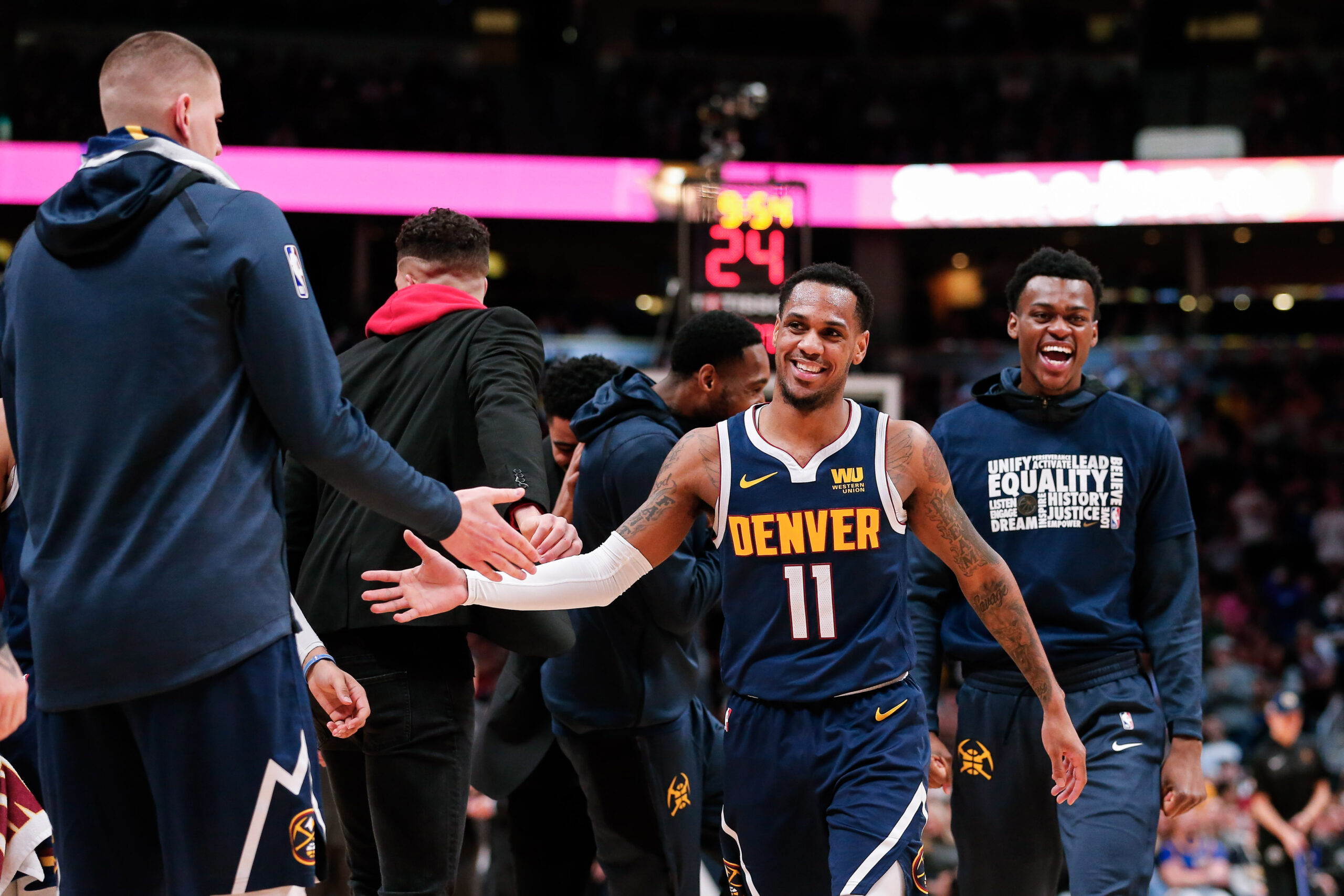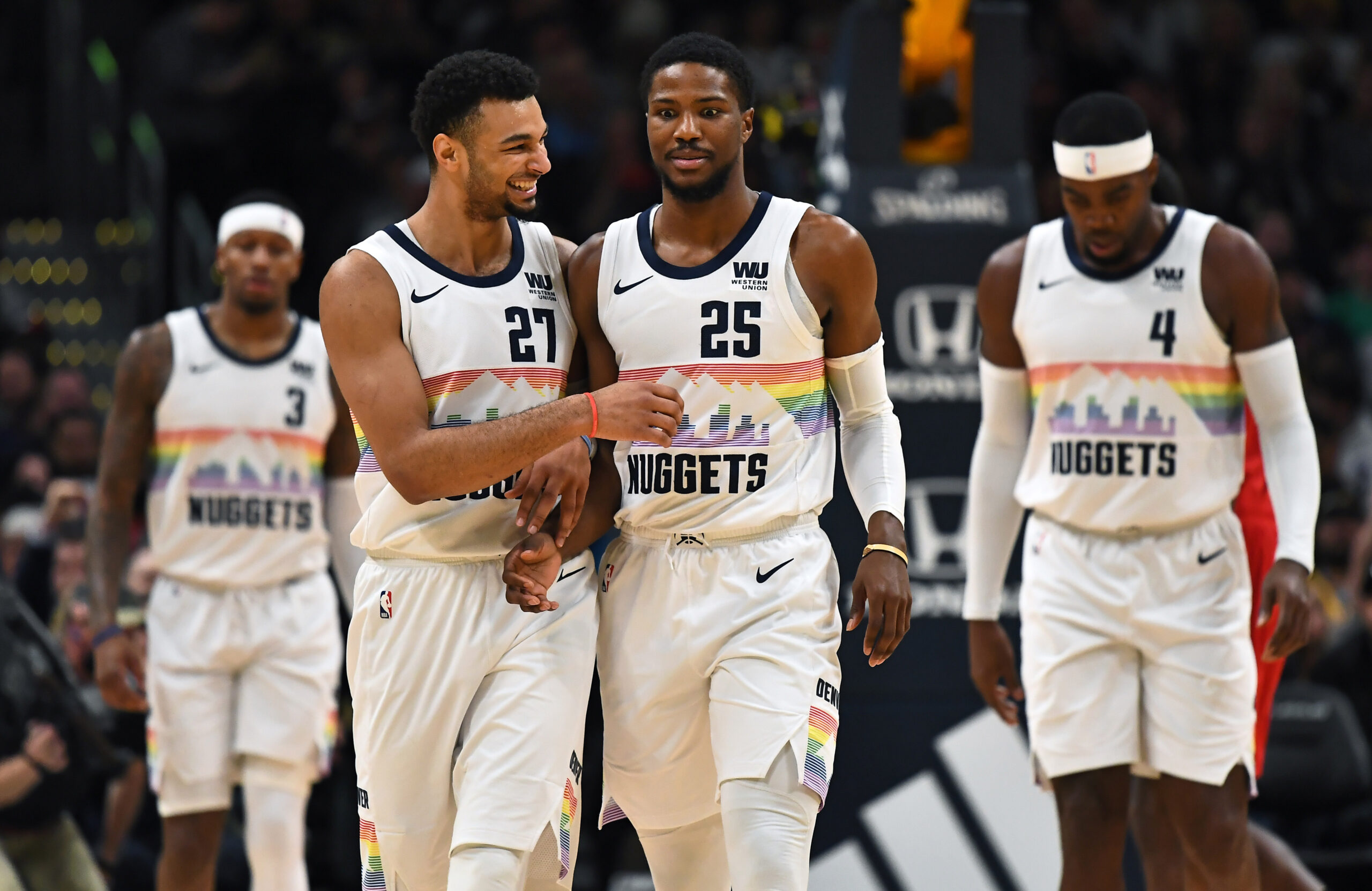© 2025 ALLCITY Network Inc.
All rights reserved.

IT’S THE WEEK OF AUGUST 13, 2018, six weeks before training camp would open, and over 1,400 miles away from the Nuggets’ practice court, the foundation for Denver’s 2018-19 season was laid.
The venue was Paul Millsap’s state-of-the-art Core 4 facility in Atlanta, Georgia where for one week Denver moved its entire basketball operations department. During the day, spirited 5-on-5 games were played across every inch of Millsap’s 44,000 square foot warehouse under the watchful eye of the Nuggets’ coaching staff. At night, team dinners and group outings gradually helped to build the tight-knit chemistry and comradery that would hopefully carry Denver to its first playoff appearance since the 2012-13 season.
It wasn’t an accident that every member of the Nuggets’ opening night roster — except Nikola Jokic and Gary Harris who were working the NBA’s Basketball Without Borders camp in Serbia at the time — wound up in Atlanta three weeks before Labor Day, which on the NBA calendar typically signals the start of most team’s preseasons. After their 2018 season ended in a fateful Game 82 in Minnesota last April, Nuggets coach Michael Malone challenged his roster. He asked everyone, from Paul Millsap — who had experienced his fair share of emotional, season-ending losses throughout his first 12 NBA seasons — to Monte Morris and Malik Beasley — who were expected to take on larger roles in Denver’s rotation next year — to not only come back better players but to buy in and commit to ensuring that next year the Nuggets wouldn’t be in the same position, fighting for their playoff lives over the final weeks of the season. A full roster making the trip down to Atlanta was the first step in a long journey.
“That,” Malone said about the Nuggets’ dedicated offseason. “Showed me how much our guys cared.”
Once the first Monday in September rolled around, the Nuggets were well ahead of rival teams when it came to their regular-season preparations. Across the league, unprecedented turnover meant that most teams would take their first few weeks together to gain a sense of familiarity with one another. But Denver returned 78 percent of their roster from last season’s 46-win team and most of their coaching staff. That continuity gave the Nuggets a leg up on the competition.
September scrimmages on Denver’s practice court were played at a high-intensity level for pre-training camp runs, according to players and coaches who were present at the time. Many games pitted Denver’s starters — Jamal Murray, Gary Harris, Will Barton, Millsap and Jokic, against the Nuggets’ bench. Denver’s continuity allowed for the Nuggets to run through their potent read-and-react offense and get re-acclimated to their defensive scheme weeks before their first preseason game. The only thing hotter than the sweltering September Denver heat was the healthy amount of trash talk exchanged between players over that month.
“Everyone knows the way that we ended the season last year,” Harris said. “A lot of guys took the summer very seriously. Everyone came back better, and once we were playing, we were able to get in the flow of things quicker because we were all here so early.”
From there, the Nuggets were off and running. Denver went 4-1 in the preseason, including two wins over LeBron James’ Lakers. Then, a 9-1 start to the regular season which featured impressive victories over Warriors, Pelicans, Jazz and Celtics at Pepsi Center — where the Nuggets have amassed the best home record in the league at 25-4 — and a road win against the Clippers on opening night.
“Continuity is a very powerful thing,” said Malone.

WHEN NUGGETS PRESIDENT OF BASKETBALL OPERATIONS Tim Connelly hired Michael Malone in 2015, he hit a figurative reset button on the entire organization. Brian Shaw’s first two years on the job — a 30-win season in 2013 followed by a 33-win campaign — didn’t go as planned and as Connelly began reconstructing Denver’s culture with Malone, he stocked the Nuggets’ locker room with talented players who he and his staff also pinpointed as high-character building blocks. The hope was that Denver’s practice court would turn into a self-motivated workplace where their players would thrive.
“It’s something we identified when we were going through some rough stretches,” Connelly said of the Nuggets’ search for high-character players. “The best way to build was with really good people and the kind of people that were emblematic of the approach we wanted to take.”
Of course, talent still wins out. You can have a locker room filled with players of the highest character, but if they can’t play, you’ll never get to see the light at the end of the tunnel. Denver, fortunately, hit on all those characteristics in the 2014 draft when Connelly selected two organizational cornerstones (Harris 19th overall and Jokic 41st), along with Jusuf Nurkic, a franchise-level center who Denver swapped for Mason Plumlee three years later.
Fast forward to the Nuggets’ present-day roster and the qualities that Jokic and Harris have brought to Denver’s practice court for the last four and five seasons respectively show up all along both walls of its locker room. Morris’ breakout sophomore campaign — the first NBA season where he’s garnered real rotation minutes — is a product of a detailed summer regiment where the Iowa State product recalibrated the form on his jump shot and lived within a stone’s throw of the Nuggets’ practice court. After inking a max contract over the summer, Jokic switched to a healthier diet, cut out sweets and “stupid snacks,” and focused his offseason training on increasing his agility and lateral quickness while adding strength so he can absorb the bumps and bruises of an 82-game season. Beasley bounced from Denver to Atlanta to Los Angeles, hired a new trainer and came into this season with a refined jumper and new mindset. Murray enjoyed his first healthy offseason as a pro and lived in his Kitchener, Ontario gym.
A workman-like attitude has the Nuggets aligned with one another, but it’s not the only characteristic that most within Denver’s locker room share. The Nuggets are also incredibly young, second-youngest-team-in-the-league young. Fifteen of the 17 players on Denver’s roster are under 30-years old. Three Nuggets starters — Murray, Harris and Jokic — are 24-years-old or younger. Beasley, Morris and Lyles, who have all been members of Malone’s rotation for most of the season are 22, 23 and 23-years-old. Millsap and Isaiah Thomas, who celebrated his 30th birthday earlier this month, are the only Nuggets in the 30-and-over club.
The roster’s youthfulness reminds Connelly and many others around the organization of a college team, one that’s close both on and off the court. If there’s a big football game on, you can find the team at Harris’ downtown apartment. On Dever’s recent four-game road trip which took the Nuggets through Detroit, Morris spent an off day in his hometown of Flint where he gave out 141 cases of water (one case for every assist he had at that point in the year) for free as the city continues to fight a nearly five-year-long water crisis. In a sign of team unity, Morris sat at a table flanked by two teammates — Barton, who grew up in Baltimore and Plumlee, who was born in Fort Wayne, Indiana — with Nuggets coaches and team personnel watching from nearby.
Before they arrived in Michigan, Morris’ teammates were already well versed on the crisis. After reading an an ESPN article over the summer about how the Philadelphia 76ers built comradery last year by having each one of their players present to the rest of their team on a subject that was important to them, Malone — in true NBA copycat form — mandated that each of his players do the same over the course of this season. Morris chose Flint, and during a 15-minute presentation to his teammates and Nuggets staffers the 23-year-old, who also donated water to his city back in college, ran through the ins and outs of the water crisis and how Flint’s population of more than 96,000 has been devastated by the loss of manufacturing jobs. More than 40 percent of Flint’s residents live in poverty, according to the most recent U.S. Census.
“I had no idea,” Plumlee said about Morris’ presentation. “I had heard a little bit about Flint, but after seeing some of the pictures and the statistics, you forgot how fortunate you are in cities like Denver. I was really impressed with what he did in college, taking a lot of fresh water to them. He’s obviously a pillar in his community, and it just speaks to who he is as a person.”
At the beginning of the year, Plumlee spoke with his teammates about an offseason trip to Israel, or as Plumlee calls it, “Startup Nation” where the seven-footer turned venture capitalist visited medical technology companies that he was interested in investing in. Beasley’s presentation focused on how to invest as a pro athlete and some of the financial lessons he learned from his rookie year after buying a house for his mother and a car for his father. Tyler Lydon spoke on the intricacies of Bowhunting, something he’s done for 10 years and still does in Southeast, Colorado.
Malone believes the presentations, which are sometimes accompanied by a powerpoint or video that’s organized with the help of a Nuggets’ video coordinator, brings his group closer to one another. They force his players off their phones and to interact face to face with one another about real-world topics and also help some get over the innate fear of public speaking. In his mind, its another ingredient to building the invaluable off and on-court chemistry that’s helped the Nuggets blow expectations out of the water so far this season.
“I think it’s a good way for everybody to learn a little bit about their teammates,” said Lydon. “For me, it’s obviously something that I’m pretty passionate about, so it’s cool to be able to explain to these guys who may not have ever had that opportunity to hunt.”

THE FIRST TIME Nuggets president Josh Kroenke and Connelly met, Kroenke kept bringing up the word “fun.” Six years later and that theme is still prevalent deep within the Nuggets’ D.N.A.
Everything about the Nuggets is fun. From their youthful and tightly-knit locker room, which likes to hold their own Around The Horn style debates about current NBA hot-button issues, to their free-flowing style of play, Denver is the epitome of a good time while the rest of the league is stuck in a period of unrest. Kevin Durant? Pissed off with the media about his looming free agency. Anthony Davis? Upset that the Pelicans didn’t trade him at last month’s deadline. LeBron James? This can’t be how he saw his first year in Los Angeles going. The Nuggets? They’re running an equal-opportunity offense around their seven-foot unicorn who’s prone to stroll into a dribble-hand-off with frontcourt partner Mason Plumlee.
That’s fun.
“We’re having a lot of fun,” said Barton. “We love playing with each other. We love passing the ball, moving the ball, seeing other people succeed. And obviously, everything’s good when you’re winning.”
A lot of teams say the right things, that they love to move the ball, that they look to get each other involved, that they don’t care who scores and who gets the credit for wins and losses. But with the Nuggets, you can actually buy what they’re selling. That mentality starts with Jokic, Denver’s franchise cornerstone who’s the center of everything they do. Jokic would rather tally an assist than score a basket.
Behind their big man, everyone else falls in line. Harris and Millsap, two pillars of Denver’s starting lineup, have both missed chunks of the season with injuries, but asked Malone to bring them off the bench when they returned to the rotation earlier this season because Denver’s current starting group had been playing well together. The Nuggets’ rotation has been ravaged by injuries all season long, meaning Torrey Craig has already logged 37 starts, but behind-the-scenes he won’t fret when his minutes dwindle as Denver returns to full health following the All-Star break. Monte Morris was Isaiah Thomas’ biggest fan during the two-time All-Star’s rehab, even though his return could eventually cut into the back up point guard’s minutes.
“We all want to see each other succeed and that’s the biggest thing,” said Murray. “We don’t care who puts the ball in; we just want to see it go in at the end of the day. That’s the greatest part about this team. No matter how bad somebody plays or somebody shoots or whatever it is, as long as we get the win, that makes up for everything.”
“You can talk about talent, you can talk about the ability to make shots, and rebound, defend, and that’s all fine and dandy,” added Malone, the rock at the center of the Nuggets’ rebuilt culture. “But at the end of the day, I’ve been around a lot of teams; this is a really close-knit team who really is truly selfless. Everybody preaches about being selfless, but right now we’ve got a lot of guys who don’t care. They just want to win, and they support each other. If I take them out of the game, they’re going to support the guy that went in the game for them. So I think the reason we’re playing so well and winning at the level were winning at is because guys truly care and love each other.”
The Nuggets’ core has grown up together — another reason why the synergy up and down their roster and organization is so rock-solid. Harris and Barton were in Denver when Jokic arrived as a wide-eyed rookie in 2015 from Serbia. They’ve watched as he’s grown into a franchise cornerstone and a more-comfortable leader. Murray, Beasley and Juancho Hernangomez were in the same 2016 draft class. Over the summer, the Nuggets had the financial flexibility to bring in a big name but stayed in-house, backing up the Brinks truck for Jokic and re-upping Barton, Craig and Morris.
That continuity has bred an unbreakable bond between teammates.
“I think people will say we’re connected because of the winning. I think we’re winning because we’re connected and we care about each other, and we truly are a selfless group,” said Malone. “The continuity, being together, not going out and signing a bunch of free agents. We signed our own guys because we wanted to bring our own guys back because we knew, Tim (Connelly) and I and Josh (Kroenke), we knew we had the makings of something really, really special this year and more importantly into the future.”

CAN CHEMISTRY CARRY THE NUGGETS to an improbable postseason run? Talent will likely get Denver to the playoffs for the first time in six seasons, as the Nuggets just need to go .500 over their remaining schedule to ease past the 50-win mark. But beyond that, Denver will enter uncharted waters.
The Nuggets, unlike the top Western Conference contenders, aren’t playoff tested. Jokic has never played a minute in the postseason. Neither have Murray or Harris. At this time last season, Beasley was only logging garbage time minutes, and Morris was lighting up the nets for the G-League’s Rio Grande Valley Vipers. Millsap and Thomas have earned their playoff stripes, and the Nuggets will surely lean on their experience when the games start to matter a little bit more, along with Plumlee, who has 27 postseason appearances with the Nets and Trail Blazers to his name.
But regardless of how Denver’s storybook seasons ends, the foundation for future success has been laid. Most of the Nuggets’ core is locked in for the next few years. Many of Denver’s young rotation pieces are under team control for the next couple of seasons. The Nuggets’ financial books are clean moving forward.
Denver’s current group is a special one, as connected, unselfish and selfless as they come. The Nuggets play the beautiful game, and even if some of the pieces change in future seasons, the culture that’s been ingrained deep within the organization won’t.
“Talent is a given. We all want talent,” said Malone. “But just as important is if the guy is going to fit into the culture we’re trying to create. Culture’s something you have to work on every single day. When you have the types of players we have, it makes it really easy.”
Comments
Share your thoughts
Join the conversation



